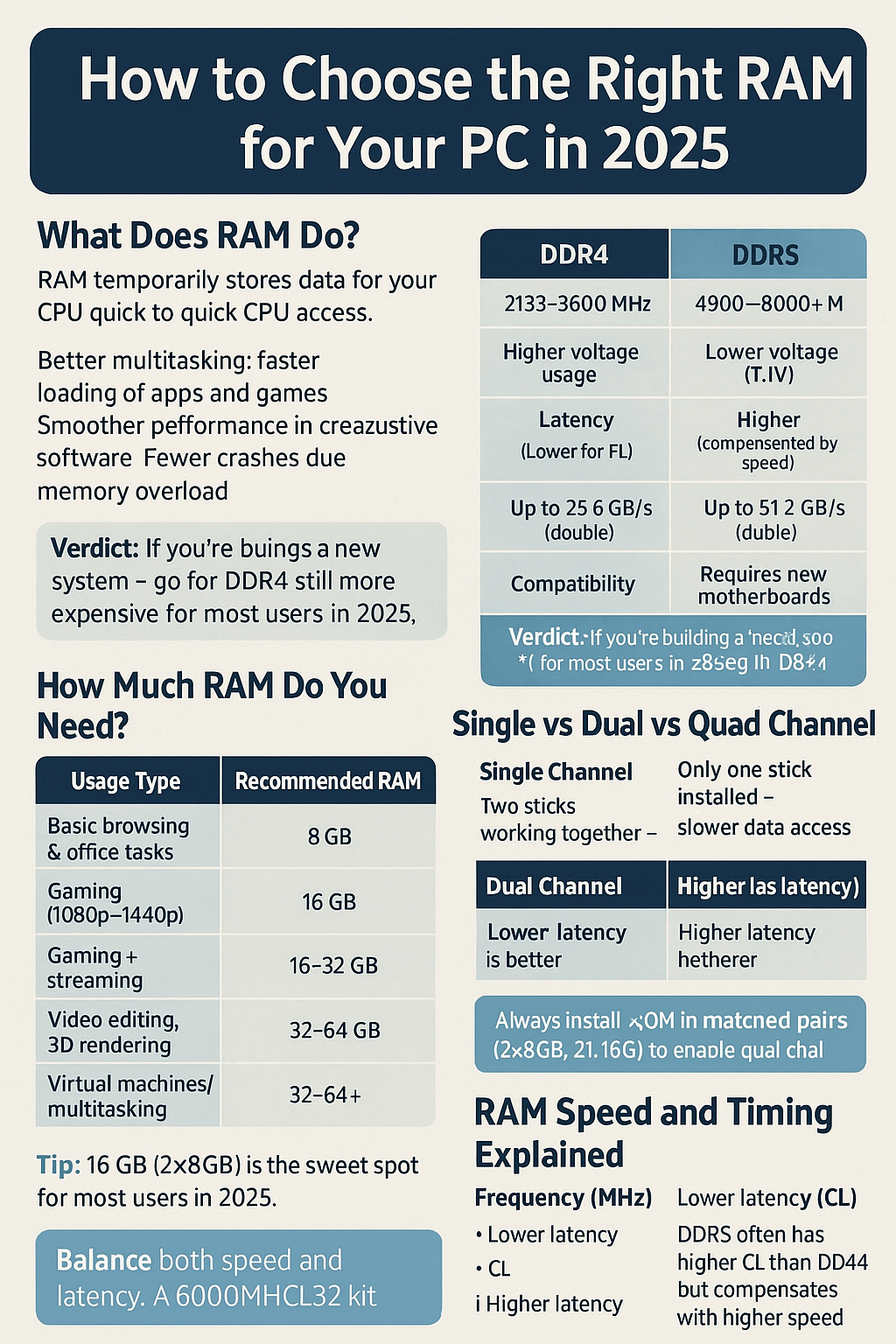Choosing the right RAM (Random Access Memory) is essential for building a balanced, responsive, and future-ready PC. RAM affects how quickly your system can switch between programs, handle multitasking, and process data-heavy tasks like gaming, video editing, or running virtual machines.
In 2025, with DDR5 becoming more widespread and applications growing more demanding, it’s important to understand what type, speed, and capacity of RAM you really need.
What Does RAM Do?
RAM temporarily stores data that your CPU needs to access quickly. Unlike storage drives (like SSDs), which retain data even when the PC is off, RAM is volatile memory — it clears when your system shuts down.
More and faster RAM means:
- Better multitasking
- Faster loading of apps and games
- Smoother performance in creative software
- Fewer crashes due to memory overload
DDR4 vs DDR5: What’s the Difference?
| Feature | DDR4 | DDR5 |
|---|---|---|
| Speed Range | 2133–3600 MHz | 4800–8000+ MHz |
| Power Efficiency | Higher voltage usage | Lower voltage (1.1V) |
| Latency | Lower latency | Higher latency (but compensated by speed) |
| Bandwidth | Up to 25.6 GB/s | Up to 51.2 GB/s (double) |
| Price | More affordable | Still more expensive |
| Compatibility | Works on older builds | Requires new motherboards |
Verdict:
If you’re building a new system with compatible components, go for DDR5. If you’re upgrading or on a tighter budget, DDR4 still offers excellent performance.
How Much RAM Do You Need?
| Usage Type | Recommended RAM |
|---|---|
| Basic browsing & office tasks | 8 GB |
| Gaming (1080p–1440p) | 16 GB |
| Gaming + streaming | 16–32 GB |
| Video editing, 3D rendering | 32–64 GB |
| Virtual machines/multitasking | 32–64+ GB |
Tip: 16 GB (2x8GB) is the sweet spot for most users in 2025.
Single Channel vs Dual Channel vs Quad Channel
- Single Channel: Only one stick installed — slower data access.
- Dual Channel: Two sticks working together — significantly better performance.
- Quad Channel: Usually only available on HEDT (high-end desktop) platforms.
Always install RAM in matched pairs (2x8GB, 2x16GB) to enable dual channel.
RAM Speed and Timing Explained
Frequency (MHz)
- Determines how fast data moves through RAM.
- Common DDR5 speeds: 5200MHz to 7200MHz
- Higher MHz = better performance, especially in gaming and editing.
CAS Latency (CL)
- Lower latency is better.
- DDR5 often has higher CL than DDR4 but compensates with higher speed.
Balance both speed and latency. A 6000MHz CL32 kit is excellent in 2025.
Voltage and Power Consumption
- DDR4: 1.2V standard
- DDR5: 1.1V standard — more efficient
This reduces power usage slightly, but mostly benefits laptops and workstations.
Compatibility: Make Sure It Fits
Motherboard Support:
- DDR4 and DDR5 are not interchangeable
- Check your motherboard specs carefully
Physical Size (DIMM):
- Desktop RAM = DIMM
- Laptop RAM = SO-DIMM
Clearance:
- Large RAM heat spreaders may block CPU air coolers. Check height before buying.
Aesthetic Features: RGB and Design
While not performance-related, many RAM kits include:
- RGB lighting (syncs with motherboard)
- Metallic or black heat spreaders
- Low-profile designs for compact builds
Choose based on your build theme or airflow constraints.
Best RAM Brands in 2025
Stick with reliable manufacturers for quality, compatibility, and warranty:
- Corsair (Vengeance, Dominator)
- G.Skill (Ripjaws, Trident Z)
- Kingston (Fury)
- Crucial (Ballistix, DDR5)
- TeamGroup (T-Force)
XMP and EXPO: Easy RAM Overclocking
- XMP (Intel) and EXPO (AMD) are BIOS profiles that automatically set your RAM to its advertised speed and timing.
- Without them, RAM may default to slower JEDEC speeds.
Tip: Always enable XMP/EXPO in BIOS for full performance.
Summary: Choosing RAM the Smart Way
Here’s what to keep in mind:
✅ Go with 16 GB or more for gaming and creative work
✅ Use dual channel kits (2 sticks minimum)
✅ Check motherboard compatibility (DDR4 vs DDR5)
✅ Match RAM speed and latency for best results
✅ Enable XMP/EXPO after installation
✅ Don’t overpay for RGB if you don’t need it
Investing in the right RAM ensures that your system runs smoothly now and stays relevant for the future. It’s one of the easiest upgrades you can make — but one of the most impactful.
